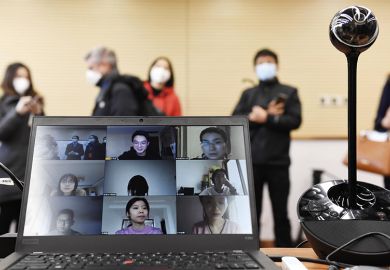Source: Paul Bateman
Plagiarism happens when students see too great a gap between their abilities and the standards they have been asked to reach
Students aren’t what they used to be. They’re disengaged, passive, absent and unable to summon an original or critical thought. Plagiarism is rife. Writing standards are atrocious.
Sound familiar? Not everyone contributes to the proliferation of such speculation about learners in higher education, but it is hard to deny that such caricatures exist. At best, these are simplistic mantras that don’t get to the heart of our responsibilities as educators. At worst, they disparage the people whose intellectual development it is our job to nurture. Some of the glib assumptions made about teaching today’s students need some serious questioning.
First, let’s take plagiarism. It is certainly a serious problem. Not only is it unethical, but just as worryingly, it prevents and obstructs learning. The temptation and opportunity to plagiarise may be greater than ever now that information and text is so easy to access.
But plagiarism has always been a problem. It happens when students see too great a gap between their abilities and the standards they have been asked to reach. Our job is to help them navigate that gap and avoid the panic that can result in deception. Students often receive the following kind of message: “Sound like academics, think like academics, talk like academics – but don’t attempt to copy academics.” An intimidating mix of signals indeed.
It is too easy to say that plagiarism indicates a problem with students. Good teachers identify ways in which assignments can be plagiarism-proof. Great teachers also help students to realise that often you have to write badly before you can write well.
We should not paralyse students with demands for grammatical perfection, analytical acuity and expressive brilliance straight away. We need to give them time and encouragement to redraft their work – to show them how each draft can uncover another layer of insight, precision and understanding that they might never have known they were capable of.
Some of the problems that students encounter with academic writing have to do with our ambivalence about our own writing struggles. By being more open about our own failures and battles we can help to demystify the learning process and invite students to become confident participants in a world that they are only beginning to understand.
Of course when engaging in this kind of conversation, class sizes are pedagogically and politically important issues. Sadly, the students who tend to require the most support – those in early undergraduate, large class contexts – are often the very students who do not get the one-to-one time they need.
Student absenteeism is another familiar complaint. There’s plenty of evidence that attendance remains linked to performance, but that link is increasingly complex.
Absence from class is not always a sign of disengagement. Students’ lives are complicated and the ability to be present at the times and places that institutions dictate is compromised for many, particularly those part-timers who we say we want to accommodate, and those who have to work to pay their bills. Our institutions need to think more creatively about how to achieve flexible delivery that allows students to engage and manage their lives.
And how about students’ evaluations of the performance of their teachers? There are regular declarations of concern about basing assessments of effective teaching on the results of student surveys. Feedback is often spoken of as flawed, invalid, a “popularity contest”.
But many of the things that distinguish excellent teachers are the same things that make them popular with their students. Psychologists have been telling us for years that enjoyment is an important building block for learners’ effective engagement and hard work. Popularity may be a good proxy for excellence in teaching after all.
It’s also important to confront the notion that new technology can address all our educational challenges. We need to be realistic about resources and persistent in our call to recognise the value of learning in small groups. Of course we can use new technologies and pedagogies in many brilliant ways to innovate, to be flexible and to transcend some of the difficulties that teachers and learners face. But in working to enhance frameworks and policies for good practice in teaching and learning, there is one aspect of a learning environment on which we should not compromise: the promotion of a culture of care. This underpins all good teaching. It involves paying attention to students – talking to them, listening to them, noticing how far they’ve come and helping them to see how much further they can go.
The best teachers in my life are the ones who cared about me. The feeling that your teachers have a personal investment in your success is one of those invisible but vital dimensions of teaching that makes learning feel so full of excitement and meaning.





